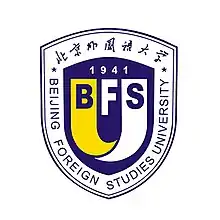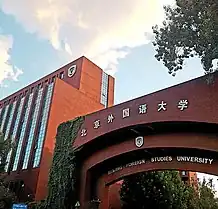 | |||||||
| Motto | 兼容并蓄 博学笃行[1] | ||||||
|---|---|---|---|---|---|---|---|
| Type | National | ||||||
| Established | 1941 | ||||||
| President | Yang Dan | ||||||
Academic staff | 2,428 | ||||||
| Students | 8,579 (932 international students) | ||||||
| Undergraduates | 5,088 | ||||||
| Postgraduates | 2,559 | ||||||
| 440 | |||||||
| Location | , | ||||||
| Campus | Urban | ||||||
| Affiliations | Beijing-Hong Kong Universities Alliance (BHUA) | ||||||
| Website | global | ||||||
| Chinese name | |||||||
| Simplified Chinese | 北京外国语大学 | ||||||
| Traditional Chinese | 北京外國語大學 | ||||||
| |||||||
.jpg.webp)
.jpg.webp)
Beijing Foreign Studies University (BFSU; Chinese: 北京外国语大学; pinyin: Běijīng Wàiguóyǔ Dàxué) is a public university in Beijing, China. It is affiliated with the Ministry of Education. The university is part of Project 211 and the Double First Class University Plan.
BFSU boasts the oldest language programs in China offering the largest number of foreign language majors on different educational levels. Located in Haidian District of Beijing. BFSU is divided into east and west campuses. BFSU offers the widest range of language studies in China: as of September 2023, there are 101 foreign languages being taught in this university.[2]
International Business School of Beijing Foreign Studies University (IBS BFSU) received accreditation from the prestigious AACSB of the United States of America which means it is one of the top 6% business schools in the world.[3] BFSU alumni are well known in Chinese diplomacy circles such as the Ministry of Foreign Affairs and the Ministry of State Security.[4] Around 400 ambassadors and over 1,000 counselors graduated from BFSU. Although most universities in East Asia do not have alumni who are Nobel laureates, Beijing Foreign Studies University has produced one Nobel Prize winner (Gao Xingjian).[5][6]
History
BFSU was affiliated with the Ministry of Foreign Affairs from its establishment in 1941 to the early 1980s and was classified a national key university under the Ministry of Education. BFSU qualified for the first round of the competition in its efforts to enter Project 211, a university development plan launched by the Ministry of Education in 1996.[7] BFSU is directly under the leadership of the Chinese Ministry of Education. BFSU is one of China's top universities listed under "Double First Class University Plan", former “Project 211” and "Project 985 Innovative Platforms for Key Disciplines".[8]
BFSU has more than 3,000 international students from all over the world, more than 100 countries.[9] Especially, South Korean, German, Malaysian (IBS) and Japanese students (School of Chinese Language and Literature) are the largest ethnic groups on campus. Some foreign students study only in Mandarin with Chinese students but most of the foreign students select international business school undergraduate program which is taught in English and can take Chinese language courses. More than 70 years, over 90,000 people have graduated from the Beijing Foreign Studies University.[10]
Teaching institutions

- International Business School (IBS)
- School of International Relations and Diplomacy (SIRD)
- School of English and International Studies (SEIS)
- School of Law (BFSULAW)
- School of English for Specific Purposes (SESP)
- School of European Languages and Cultures (SELC)
- School of International Journalism and Communication (SIJC)
- School of Asian Studies
- School of African Studies
- School of Arabic Studies
- School of Russian
- School of Marxism
- School of Chinese Language and Literature
- School of Art and Research
- Graduate School for Translation and Interpreting
- School of French
- School of German
- School of Spanish and Portuguese
- School of Japanese
- School of Computer Science
- School of Physical Education
- School of Information Science and Technology
- School of History
Rankings and reputation
.jpg.webp)
BFSU is a research university specializing in foreign language studies.[11] BFSU ranked 17th out of almost 3,000 higher education institutions in China according to statistics based on National College Entrance Examination (Gaokao) from 2012 to 2023.[12][13]
As of 2023 Beijing Foreign Studies University ranked no.1 among universities in China specializing in language studies and research in the recent edition of the Best Chinese Universities Ranking.[14] The university consistently features in the top 100 international universities in linguistics as ranked by the QS World University Rankings by subjects.[15] BFSU is also highly ranked by the world universities rankings in "Arts and Humanities", "Modern Languages", " English Language and Literature" and "Education".[16][17]
Academic Ranking of World Universities (ARWU)
Academic Ranking of World Universities (ARWU), also known as the Shanghai Ranking, is one of the annual publications of world university rankings. It's the first global university ranking with multifarious indicators.
| Year | Rank | Valuer |
|---|---|---|
| 2023 | 1[18] | ARWU Best Chinese Universities Ranking - Ranking of Chinese Language Universities |
Notable people
- Gao Xingjian, Chinese French novelist who was awarded the Nobel Prize for Literature "For an Oeuvre of Universal Validity, Bitter Insights and Linguistic Ingenuity." Graduated from the Department of French.[19]
- Jin Liqun, President of Asian Infrastructure Investment Bank (AIIB) and Former Vice President of Asian Development Bank (ADB)
- Thae Yong-ho, Member of the National Assembly (South Korea). North Korean-born South Korean politician, and former DPRK's deputy ambassador to the United Kingdom. The first North Korean defector to win a National Assembly (South Korea) seat.[20]
- Cui Tiankai, Chinese diplomat and longest-serving Chinese Ambassador to the United States.
- Yang Lan, co-founder and chairperson of the Sun Media Group and the Sun Culture Foundation. Forbes magazine's 100 World's Most Powerful Women.
- He Jiong, ranked 53rd on Forbes China Celebrity 100 list.
- Hao Ping, present president of Peking University, former president of Beijing Foreign Studies University.
- Hu Xijin, former editor-in-chief of Global Times
References
- ↑ https://m.sohu.com/n/482178609/ Premier Wen Jiabao's letter celebrating the 70th anniversary of the founding of the BFSU was later used as a school motto."Compatibility", This motto comes from Cai Yuanpei's idea of "freedom of thought and compatibility" when he was president of Peking University. This motto means a kind of world vision and open mind.“兼容并蓄,博学笃行”是温家宝总理在北外建校七十周年贺信中提出的,后被用作北外的校训。“兼容并蓄”,源自蔡元培任北大校长时提出的“思想自由,兼容并包”,“兼容并蓄”意味着一种世界眼光和开放性胸怀,既是世界不同文化文明的兼容,又是以外语为主的其他学科的兼容,同时孕育着创新
- ↑ "About BFSU".
- ↑ "https://www.aacsb.edu/accredited/i/international-business-school-beijing-foreign-studies-university". www.aacsb.edu. Retrieved 2023-10-30.
{{cite web}}: External link in|title= - ↑ "School of International Journalism and Communication". Beijing Foreign Studies University. Archived from the original on 7 December 2021. Retrieved 5 December 2022.
- ↑ 기자, 최준호 (2023-10-02). "100년전부터 10월이면 '노벨상 앓이'…한국 왜 노벨상 집착하나". 중앙일보 (in Korean). Retrieved 2023-11-17.
- ↑ 연합뉴스. "가오싱젠 Nobel Price". n.news.naver.com (in Korean). Retrieved 2023-11-17.
- ↑ "网站地图—中国教育在线". www.eol.cn. Archived from the original on 2009-06-24. Retrieved 2018-09-03.
- ↑ "211工程大学名单". China Education Online Service (中国教育在线). Retrieved 27 January 2019.
- ↑ Chiu, Christine (2021-01-27). "Top 100 Most Popular Universities for International Students in China". China Admissions. Retrieved 2022-10-09.
- ↑ "大学简介". 北外官方网. Retrieved 30 March 2018.
- ↑ "高校排名:2014年中国语言类大学排行榜". Retrieved 30 September 2015.
- ↑ "【2018版中国大学近5年录取分数排行榜】". Huadong Normal University. 2 July 2018. Retrieved 2 July 2018.
- ↑ "2020版中国大学录取分数排行榜". 搜狐新闻. Retrieved 24 March 2021.
- ↑ "ShanghaiRanking's Best Chinese Universities Ranking". www.shanghairanking.com. Retrieved 2022-01-07.
- ↑ "Linguistics". Top Universities. Retrieved 2021-03-06.
- ↑ "Beijing Foreign Studies University". Top Universities. Retrieved 2022-11-21.
- ↑ "ShanghaiRanking-Univiersities". www.shanghairanking.com. Retrieved 2022-11-21.
- ↑ "ShanghaiRanking's Best Chinese Universities Ranking". ShanghaiRanking Consultancy. Retrieved 1 April 2023.
- ↑ "The Nobel Prize in Literature 2000". Nobelprize. October 7, 2010. Retrieved October 7, 2010.
- ↑ "Foreign Policy Association".
External links
39°57′15″N 116°18′15″E / 39.95417°N 116.30417°E